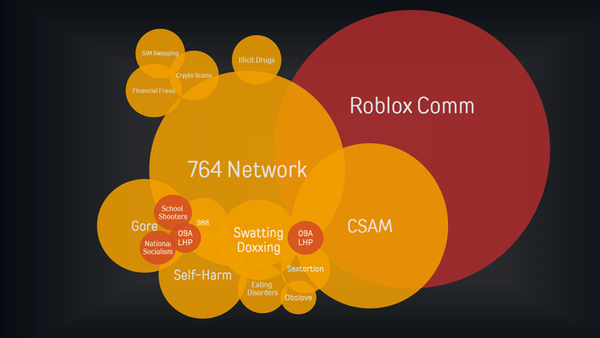Major Sex Trafficking Takedowns 2024-2025: A Global Crackdown on Digital Exploitation

Executive Summary
The past 18 months have witnessed an unprecedented global assault on sex trafficking networks, with law enforcement agencies coordinating massive operations that have resulted in thousands of arrests and rescued countless victims. From the 764 Network's predatory gaming exploitation to sophisticated international cyber-scam trafficking rings, these operations reveal the evolving landscape of digital exploitation and the determined response from global authorities.

The Scale of the Crisis
Operation Restore Justice alone, conducted in April 2025, resulted in the arrest of 205 child sexual abuse offenders and the rescue of 115 children across the United States in just five days. This operation represents just one piece of a much larger puzzle of coordinated international efforts.
According to the 2024 Trafficking in Persons Report from the U.S. State Department, digital tools have amplified the reach, scale, and speed of trafficking, with perpetrators using dating apps, online platforms, encrypted messaging, and digital currencies to evade detection.

Major Operations and Takedowns
Operation Restore Justice (April 2025)
The most significant domestic operation in recent memory, Operation Restore Justice was executed by all 55 FBI field offices over five days in April 2025, resulting in 205 arrests and 115 children rescued. The operation targeted various forms of exploitation including:
- Production, distribution, and possession of child sexual abuse material
- Online enticement and transportation of minors
- Child sex trafficking
Among those arrested was Jerry N. Butler III, believed to be involved in the "764" network, whose members seek to corrupt and exploit vulnerable populations, including minors. The operation demonstrated how predators infiltrate trusted positions, with arrests including law enforcement officers, military personnel, and teachers.
Operation Global Chain (June 2025)
This international operation led by Austria and Romania, with support from Europol, Frontex, and INTERPOL, resulted in 158 arrests and the safeguarding of 1,194 potential victims from 64 different countries. The operation involved nearly 15,000 officers from 43 countries and focused on:
- Sexual exploitation
- Forced criminality
- Forced begging
- Special focus on underage victims
Austrian law enforcement dismantled a Romanian family-based organized crime group using the 'lover-boy method' to lure victims under false pretenses of relationships before subjecting them to sexual exploitation.

INTERPOL's Global Response to Cyber-Scam Trafficking
INTERPOL has identified a growing crime phenomenon where tens of thousands have been trafficked to Southeast Asia and forced to commit cyber-enabled financial crime on an industrial scale. As of March 2025, victims from 66 countries were trafficked into online scam centers, with no continent left untouched.
Operation Storm Makers II mobilized law enforcement in 27 countries, resulting in 281 arrests for offenses including human trafficking, passport forgery, corruption, telecommunications fraud, and sexual exploitation.
Operation Synergia (2023)
INTERPOL's Operation Synergia, conducted between September and November 2023, targeted cybercrime infrastructure and human trafficking rings linked to cyber scam centers. The operation shut down 70% of 1,300 identified malicious servers and arrested 31 individuals.
The Digital Evolution of Trafficking
Gaming Platforms and Social Media
The 764 Network case highlights how predators exploit gaming platforms and social media to target children. These networks use sophisticated psychological manipulation techniques to:
- Establish trust through shared gaming interests
- Gradually introduce exploitative content
- Use blackmail and coercion to maintain control
- Operate across multiple platforms to avoid detection
Crypto-Romance Scamming Operations
Recent operations have revealed sophisticated cryptocurrency fraud networks, with Europol dismantling a $540 million operation in June 2025 that followed patterns of cryptocurrency confidence or romance baiting schemes.
Artificial Intelligence Integration
INTERPOL reports show that AI has been used to develop convincing fake job ads that attract human trafficking victims as well as generate online photos or profiles through 'deepfake' technology for sextortion and romance scams.

Geographic Patterns and Trends
Southeast Asia as Primary Hub
Seventy-four percent of human trafficking victims were brought to centers in Southeast Asia over the past five years, though online scam centers have increasingly been observed in the Middle East, West Africa, and Central America.
Global Victim Demographics
Potential victims were reported from 64 different countries, with a majority from Romania, Ukraine, Colombia, and China, demonstrating the truly international scope of modern trafficking operations.
Law Enforcement Response and Coordination
Multi-Agency Cooperation
The success of these operations demonstrates unprecedented cooperation between:
- FBI and Department of Justice: Leading domestic operations
- INTERPOL: Coordinating international efforts
- Europol and Frontex: Managing European response
- Private Sector Partners: Including tech companies and cybersecurity firms

Technology-Enhanced Investigations
Law enforcement agencies are leveraging AI-powered tools for victim identification, employing various methods for finding victims online and allowing for self-reporting exploitation.
Victim-Centered Approaches
Between 2021-2024, HHS responded to more than 43,000 potential trafficking situations reported to the National Human Trafficking Hotline and supported more than 20,000 survivors with comprehensive case management services.
Legislative and Policy Responses
Enhanced Legal Framework
On May 27, 2024, the EU Council adopted new rules to reinforce the fight against trafficking in human beings, making the knowing use of services provided by trafficking victims a criminal offense and establishing mandatory National Anti-Trafficking Coordinators.

Data Collection and Reporting
The number of persons prosecuted for human trafficking more than doubled from 2012 to 2022, increasing from 805 to 1,656 persons, while convictions increased from 578 to 1,118 persons.

The Road Ahead
Emerging Challenges
The integration of advanced technologies like deepfake AI and sophisticated encryption poses new challenges for law enforcement. Criminal networks are becoming more fragmented and technically sophisticated, requiring constant adaptation of investigative techniques.

International Cooperation
"Tackling this rapidly globalizing threat requires a coordinated international response," according to INTERPOL's Acting Executive Director of Police Services. The success of recent operations demonstrates that coordinated international efforts can effectively disrupt even the most sophisticated trafficking networks.
Prevention and Awareness
Public awareness campaigns, improved digital literacy, and enhanced reporting mechanisms remain crucial components of the comprehensive response to digital exploitation.

Conclusion
The major trafficking takedowns of 2024-2025 represent a turning point in the global fight against exploitation. While the scale and sophistication of trafficking networks continue to evolve, law enforcement agencies have demonstrated their ability to adapt and coordinate effective responses. The success of operations like Restore Justice and Global Chain provides hope that continued international cooperation can dismantle these networks and protect vulnerable populations from exploitation.
However, the fight is far from over. As criminal networks adapt to new technologies and develop more sophisticated methods of operation, law enforcement must continue to evolve their approaches, strengthen international cooperation, and leverage technology to stay ahead of those who would exploit the most vulnerable members of society.
For more information on protecting yourself and your family from digital exploitation, visit the National Center for Missing and Exploited Children at missingkids.org or report suspected trafficking to the FBI at tips.fbi.gov.














